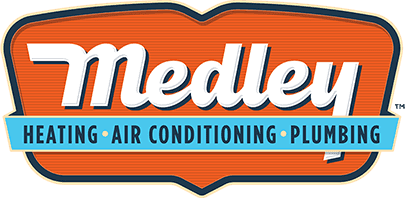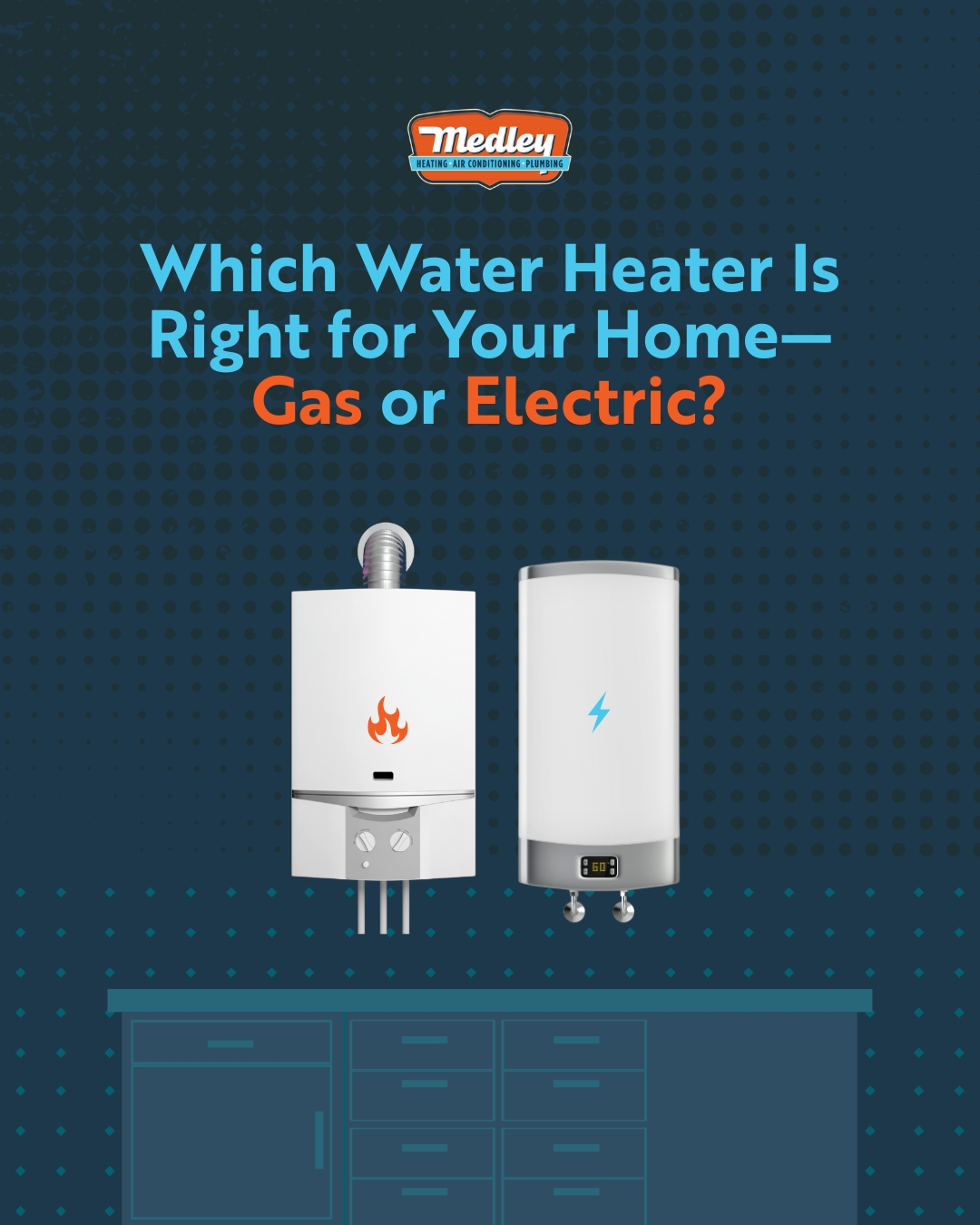Key Takeaways
- The differences between gas and electric water heaters affect cost, efficiency, installation, and performance.
- Gas heaters generally recover hot water faster, while electric models are easier to install and maintain.
- Your household size, utility connections, and other factors determine the best type of water heater for your home.
Trying to Decide Between Gas and Electric? Here’s What You Need to Know
If you’re unsure whether to choose a gas vs. electric water heater, consider how your household size, water usage, and other factors may affect performance and long-term costs. Both types deliver hot water for everyday use, but they work differently and offer different benefits. Medley’s licensed technicians are available to guide you through each option.
What’s the Difference Between a Gas and Electric Water Heater?
Gas and electric water heaters warm water for showers, laundry, and dishes, but they differ in operation. Their designs, installation requirements, efficiency levels, and other characteristics vary in ways that affect energy bills, convenience, and safety.
- Gas water heaters: These units heat water with a burner at the bottom of the tank, fueled by natural gas or propane. They require venting to release combustion gases and a gas line connection for fuel.
- Electric water heaters: These systems use electric resistance coils to heat water. They’re easier to install since they don’t involve combustion or venting and only need a dedicated 240-volt electrical circuit.
Pros and Cons of Gas vs. Electric Water Heaters
Both types of water heaters offer advantages depending on your goals and your home’s infrastructure. Consider performance, efficiency, and ownership costs to weigh the pros and cons of gas and electric water heaters.
Upfront cost
Electric water heaters tend to cost less upfront since installation is simpler compared to gas units. Gas water heaters usually have higher initial installation costs to account for the added complexity of adding exhaust systems and gas line connections.
Energy efficiency and long-term operating costs
Since they convert almost all electrical energy into heat, electric models are generally more energy efficient than gas water heaters. However, electricity rates may be more expensive in certain areas, which can result in higher bills.
Gas heaters have slightly lower efficiency ratings due to heat loss through venting. Even so, gas is often more affordable than electricity, which may save more on utility bills over the heater’s lifespan, particularly if your household has high hot water demand.
Speed & hot water recovery time
Gas water heaters typically heat water more quickly than electric units, and this recovery time makes a difference for busy households with heavy usage habits. Electric heaters recover hot water more slowly, which may cause delays during peak usage.
Safety, installation, and maintenance
Electric water heaters don’t use ventilation or combustion, so they don’t carry risks of carbon monoxide or natural gas leaks. Maintenance is also simpler since electric units have fewer and less complex components than gas models.
Gas heaters have more complex installation and safety requirements. Maintenance includes periodic burner, flue, and ignition system inspections to minimize the risk of gas-related hazards.
Lifespan & reliability
Gas and electric water heaters last about 10 years, though electric units can maintain reliable and efficient operation for up to 15 years. Electric models are more resistant to internal corrosion because they operate at lower temperatures and don’t involve combustion.
How Do I Know Which Water Heater Is Right for My Home?
Deciding which is better between gas or electric water heaters depends on your home’s utility connections and your household’s needs. Here are a few questions to help guide your decision.
- Do you have access to natural gas or propane? If your home already has a gas line, a gas water heater may be more economical — otherwise, electric models are often the simplest and most affordable option.
- Is your household small, average, or large? Large households may prefer the recovery speed of a gas unit.
- Do you want the lowest upfront cost or long-term savings? Electric units are generally less expensive to install, but gas models may offer better long-term value.
- Is safety or installation speed more important to you? Electric heaters are easier to install and don’t carry the risk of gas or carbon monoxide leaks. Gas heaters are safe with proper installation, but require more planning and labor.
Benefits of Choosing Medley for Your Water Heater Installation
If you’re searching for water heater installation near me, Medley offers dependable service throughout Carrollton and surrounding communities. Here’s what sets our team apart:
- We’re a local and family-owned business with decades of experience.
- Our plumbers are fully licensed and insured.
- We provide honest recommendations based on your home’s setup.
- Same-day installation and emergency replacement options are available.
- Our clear cost pricing model breaks down every charge, and we offer flexible financing options.
Our Water Heater Services in Carrollton, TX & Nearby Areas
We provide water heater installation near you in Carrollton and other areas, including:
- Carrollton, TX: 75006, 75007, 75010, 75011
- Addison
- Farmers Branch
- The Colony
- Plano
- Lewisville
- North Dallas
Install a Hot Water Heater You Can Count On
At Medley, we simplify the decision between gas and electric water heaters by providing expert knowledge based on decades of experience. We provide electric water heater and gas water heater installation in Carrollton, Texas. Contact us or schedule a gas or electric water heater replacement service online.
Frequently Asked Questions
Do gas water heaters work during power outages?
Some gas water heaters can operate during power outages, especially models with a pilot light ignition instead of electronic controls. However, many newer units use electric ignition or safety systems, which means they won’t function without electricity. Electric water heaters don’t work during outages.
What size water heater do I need for my household?
The right water heater size depends on your household’s daily hot water usage. A family of four may need an 80-gallon tank, while a 50- to 60-gallon tank is often enough for smaller households.
Can I install a water heater myself?
Some areas allow homeowners to install their own water heaters, but this requires plumbing, electrical, and natural gas expertise. Improper installation can cause safety risks and damage to equipment.

